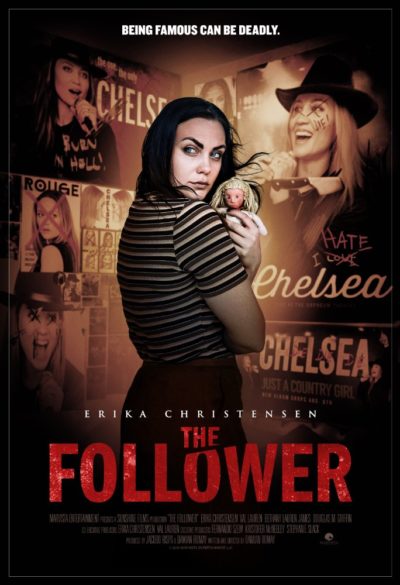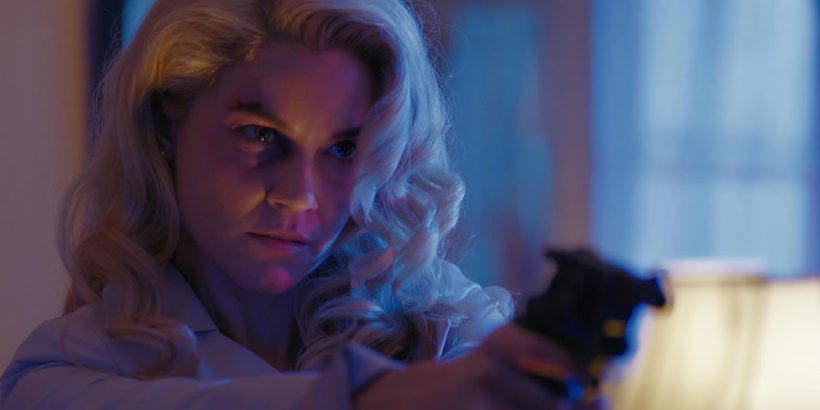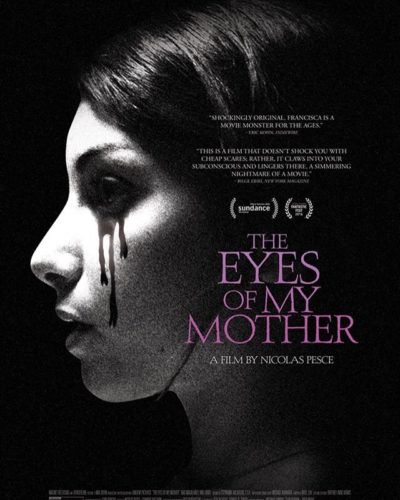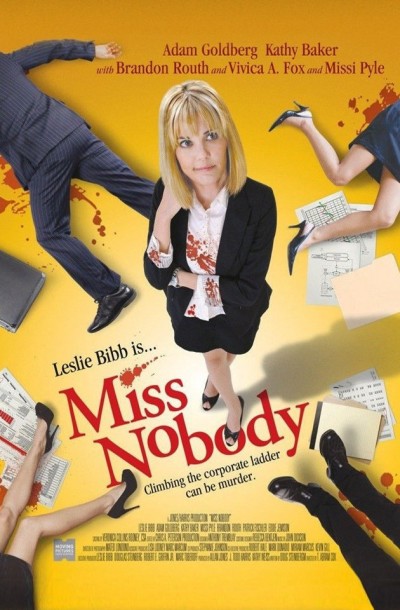★★½
“Misery loves company”
 Country singer Chelsea Angel (Christensen) announces to her fanbase that’s she taking a time-out from touring and recording – not least because of her recently-discovered pregnancy. Her flight home crashes in the middle of nowhere, and she wakes up to find herself chained up in a remote cabin, along with another survivor, Evelyn (James). Except, it soon turns out that Evelyn isn’t the innocent air hostess she initially appears. She’s Chelsea’s most obsessive and dedicated fan, who was actually responsible for the plane going down. And now, she has the object of her affection – not to mention, her unborn baby – all to herself, for some quality time, in which she can address Chelsea’s new style, with which Evelyn is not happy. Meanwhile, the singer’s boyfriend, Dillon (Lauren), and the guy in charge of her fan-club, Frank (Kirkpatrick), are trying to figure out where Chelsea has gone, following the online trail Evelyn left behind.
Country singer Chelsea Angel (Christensen) announces to her fanbase that’s she taking a time-out from touring and recording – not least because of her recently-discovered pregnancy. Her flight home crashes in the middle of nowhere, and she wakes up to find herself chained up in a remote cabin, along with another survivor, Evelyn (James). Except, it soon turns out that Evelyn isn’t the innocent air hostess she initially appears. She’s Chelsea’s most obsessive and dedicated fan, who was actually responsible for the plane going down. And now, she has the object of her affection – not to mention, her unborn baby – all to herself, for some quality time, in which she can address Chelsea’s new style, with which Evelyn is not happy. Meanwhile, the singer’s boyfriend, Dillon (Lauren), and the guy in charge of her fan-club, Frank (Kirkpatrick), are trying to figure out where Chelsea has gone, following the online trail Evelyn left behind.
The straight two-handed stuff between Evelyn and Chelsea is not bad. It’s especially effective during the early going as the dynamic between the pair shifts, and Chelsea gradually realizes her plight. The tipping moment is likely when Evelyn starts burbling about how they both had chips in their head, but she had hers removed. It’s at that point, I think, we realized we were deep into Annie Wilkes territory, and that Stephen King adaptation looms over this the rest of the way. Christensen isn’t exactly James Caan, and James isn’t Kathy Bates either, yet they’re competent enough to keep this interesting. Chelsea’s pregnancy adds a twist, and if this wasn’t a TV movie, I’d have been wondering if Evelyn was going to go all Beatrice Dalle on Chelsea’s stomach.
The stuff outside the cabin is much less effective, ranging from the simply dull to wildly implausible. For instance, Chelsea is such a big star she can “sell out stadiums” – though the audience for her concert which opens it, is in the several dozens. But we’re we’re expected to believe that she is the only person with the website password which will allow access to Evelyn’s purchase history there, and thus, her address. Yeah: I’m sure Taylor Swift packs and ships her own T-shirts too.
Even when the necessary information is obtained – and you’ll be yelling the password at the screen long before Dillon figures it out – they don’t bother to notify the authorities. Instead, Frank wanders off to investigate on his own, with entirely predictable (and not undeserved) results. Anybody who thinks men are the smarter sex, needs to watch this. Everyone else? We can probably take or leave this at will. The thought strikes me that it could possibly be adapted into an interesting stage-play, for some fringe theatre company, just using two actresses. This might end up delivering the psychological intensity necessary, only present here in intermittent and sporadic bursts – and largely overshadowed by the idiocy of the supporting characters.
Dir: Damián Romay
Star: Erika Christensen, Bethany Lauren James, Val Lauren, Jason Kirkpatrick






 When I told Chris the title of this one, I swear you could hear her eyes rolling at the mere thought of it. But by the end, even she had to admit to having been won over by its dark charms. Most obviously is the sense of black humour which isn’t just dry, it’s as arid as the Atacama Desert. Morgan (Jungermann) and Jean (Carr) are fascinated by female serial killers, running a podcast on the topic which has acquired its own, unique fanbase. Morgan falls for Simone (Vand), a colleague at the food co-operative where she works. But Jean – who is also Morgan’s ex – can’t help thinking there is something seriously off with Simone.
When I told Chris the title of this one, I swear you could hear her eyes rolling at the mere thought of it. But by the end, even she had to admit to having been won over by its dark charms. Most obviously is the sense of black humour which isn’t just dry, it’s as arid as the Atacama Desert. Morgan (Jungermann) and Jean (Carr) are fascinated by female serial killers, running a podcast on the topic which has acquired its own, unique fanbase. Morgan falls for Simone (Vand), a colleague at the food co-operative where she works. But Jean – who is also Morgan’s ex – can’t help thinking there is something seriously off with Simone. The film never tries to hide the fact that Jessica is nutty as a fruitcake. As a result, its plotting is instead very much concerned just with getting the story from Point A to B, offering few surprises. I’m not exactly convinced by the “Based on a true story” claim here. And let’s not even start with the police procedures depictede: let’s just say, Stillwater PD could use some re-training, and move on. Yet the pleasures outweighed the deficiencies; in particular, as mentioned, watching the mousy Faith and psychotic glam-girl Jessica face off. The latter gets most of the cinematic highlights, vamping it up to great effect. Witness, for example, her hyper-ventilating in order to place a convincingly panicked phone call to her lover. Guess all Jessica’s acting classes finally paid off!
The film never tries to hide the fact that Jessica is nutty as a fruitcake. As a result, its plotting is instead very much concerned just with getting the story from Point A to B, offering few surprises. I’m not exactly convinced by the “Based on a true story” claim here. And let’s not even start with the police procedures depictede: let’s just say, Stillwater PD could use some re-training, and move on. Yet the pleasures outweighed the deficiencies; in particular, as mentioned, watching the mousy Faith and psychotic glam-girl Jessica face off. The latter gets most of the cinematic highlights, vamping it up to great effect. Witness, for example, her hyper-ventilating in order to place a convincingly panicked phone call to her lover. Guess all Jessica’s acting classes finally paid off! “Post-horror” is now, apparently, A Thing. It refers to horror films that subvert the traditional tropes and style of the genre in some way. Though based on the so-tagged example of it I’ve seen, the main subversion appears to be “not being frightening.” I think there’s a spot of pretension mixed in as well, since horror is generally regarded as marginally above pornography in terms of critical appreciation. By calling it something else, this gives those who turn their nose up at “horror” a chance to appreciate it. But it’s a bit of a double-edged sword for marketing, because you’re as likely to lose fans of “true” horror, who have been burned badly by films riding on the genre’s coat-tails.
“Post-horror” is now, apparently, A Thing. It refers to horror films that subvert the traditional tropes and style of the genre in some way. Though based on the so-tagged example of it I’ve seen, the main subversion appears to be “not being frightening.” I think there’s a spot of pretension mixed in as well, since horror is generally regarded as marginally above pornography in terms of critical appreciation. By calling it something else, this gives those who turn their nose up at “horror” a chance to appreciate it. But it’s a bit of a double-edged sword for marketing, because you’re as likely to lose fans of “true” horror, who have been burned badly by films riding on the genre’s coat-tails. Scar (Cole) has anger issues, which we see in the opening scene, where she stabs her boyfriend to death. Scarlett (Kimmel) makes her living by having affairs with married men, then blackmailing them. The two women team up after Scar rescues Scarlett, when one of her extortion targets is beating her up in an alley. The pair subsequently begin an odd relationship, peppered with bursts of brutal violence against men. The police investigation, led by Detective Mike (Wells) passes over them, but Mike begins a relationship with Scarlett, until he begins to suspect that her friend is involved in the string of killings.
Scar (Cole) has anger issues, which we see in the opening scene, where she stabs her boyfriend to death. Scarlett (Kimmel) makes her living by having affairs with married men, then blackmailing them. The two women team up after Scar rescues Scarlett, when one of her extortion targets is beating her up in an alley. The pair subsequently begin an odd relationship, peppered with bursts of brutal violence against men. The police investigation, led by Detective Mike (Wells) passes over them, but Mike begins a relationship with Scarlett, until he begins to suspect that her friend is involved in the string of killings. Right from the start, it’s established that Venus (Kendra) is not the most mentally stable of creatures, alternating between emotional fits in the bathtub, drug abuse and her day job as a stripper. That’s pretty much the trifecta of Stay Away for any man. But she ends up dating one of her strip-club customers, Brian (Naismith), a photographer who likes Venus because… she reminds him of his late wife. Which as opening lines go, I’d imagine would rank highly as Stay Away for any woman. While initially working far better than you’d expect, that only makes the eventual crash and burn of their relationship, all the more brutal.
Right from the start, it’s established that Venus (Kendra) is not the most mentally stable of creatures, alternating between emotional fits in the bathtub, drug abuse and her day job as a stripper. That’s pretty much the trifecta of Stay Away for any man. But she ends up dating one of her strip-club customers, Brian (Naismith), a photographer who likes Venus because… she reminds him of his late wife. Which as opening lines go, I’d imagine would rank highly as Stay Away for any woman. While initially working far better than you’d expect, that only makes the eventual crash and burn of their relationship, all the more brutal. Stumbled across this low-budget horror flick almost by accident when I was Googling the similarly-titled but very different,
Stumbled across this low-budget horror flick almost by accident when I was Googling the similarly-titled but very different,  A date appears to go badly wrong for Julia (Azlynn), when her companion (Sorbo) turns out to be a serial-killer who has been using Internet dating sites to find the young women he targets. However, it turns out the tables are eventually turned, for Julia and her sister Jessica (Willis) are every bit as monstrous, who have been luring in and killing men, as a result of the abuse they both suffered at the hands of their father. But Jessica is a bit fed up of taking a back seat to her big sis, and wanders across the street to kidnap a victim of her own (Moore). But Julia’s captive is not exactly prepared to give up his liberty without a fight.
A date appears to go badly wrong for Julia (Azlynn), when her companion (Sorbo) turns out to be a serial-killer who has been using Internet dating sites to find the young women he targets. However, it turns out the tables are eventually turned, for Julia and her sister Jessica (Willis) are every bit as monstrous, who have been luring in and killing men, as a result of the abuse they both suffered at the hands of their father. But Jessica is a bit fed up of taking a back seat to her big sis, and wanders across the street to kidnap a victim of her own (Moore). But Julia’s captive is not exactly prepared to give up his liberty without a fight.